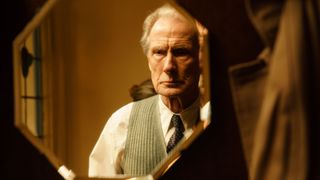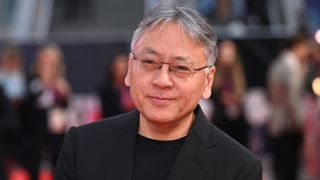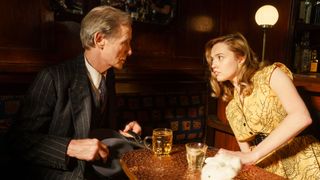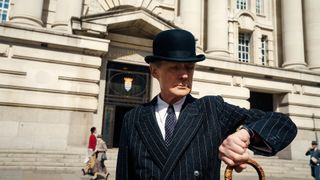Few directors have had the audacity to remake cult classic films – Gus Van Sant's Psycho, an almost shot-for-shot reimagining of Alfred Hitchcock's iconic horror, comes to mind – and fewer yet have been successful in their endeavors. Yet, Living, a remake of Akira Kurasawa's Ikiru, is an excellent production that pays homage to the original yet also brings something new to the story.
Directed by Oliver Hermanus, Living centers on Bill Nighy's Mr. Williams, a bureaucratic local London council worker, in charge of the planning department. Papers are pushed around, but little is actually actioned. However, after Mr. Williams receives some life-changing news, his whole perspective is changed, and he finally learns to live a little.
While Hermanus was behind the camera, the project was primarily pushed forward by Kazuo Ishiguro, the Noble Prize-winning author of The Remains of the Day. He tells Total Film that he had "dissatisfactions" with the original movie, despite it having a profound effect on his own outlook on life. Below, read a Q&A of our conversation with Ishiguro alongside Hermanus as they reveal why they decided to remake Kurasawa's cult classic. Edited for length and clarity.

Total Film: The Akira Kurosawa movie is obviously many years old now – so why revisit this story now, at this point in time, and transport it to this setting?
Ishiguro: Ikiru was a film I grew up with. When I was a child, it was very difficult to see Japanese movies in England. And that was one of the few that you could watch on BBC Two and in arthouse cinemas. It had a profound effect on me as I was growing up, and I think it's continued to literally influence the way I go about doing things and regarding life. So it's not like suddenly I thought, 'Well, it'd be good to do it now!'
But this idea of bringing it to a new generation was something I was feeling more and more. Although people say they know the film, Ikiru, the classic by Kurosawa, when you really dig deeper, I found that lots of people haven't seen the film or they last saw it 40 years ago. The other thing that occurred to me is that, in the modern world, late capitalism, where people are working long, long hours, they're working in jobs and companies that are so fragmented, they don't quite understand how their bit of the operation relates to the wider operation, how it contributes to society. They work really hard, creating a contribution but they don't know what happens to their contribution. And it's very easy in this situation, just to get ground down by the new daily rhythm. It seems to me that in Ikiru, although you see a Japanese bureaucracy in a block of offices in Tokyo in the early 50s, that's a metaphor for where a lot of us are having to live now.
It's funny that this works as a companion piece to Remains of the Day, in which an elderly man reflects on his life and what he contributed to work. Did you see it that way? And what did you want to say that was new in this story?
Ishiguro: What I wanted to say, as a screenwriter, that wasn't in the Kurasawa film, was I wanted to add the English gentleman and the aspiration to be an English gentleman, whatever that meant. I don't think you have to actually be English, or of a certain age, to be interested in English gentlemen. We're all English gentlemen, a little part of us, wherever we come from, whichever generation we are, it's part of the human condition. We have a little bit of English gentleman in us with all the strengths and weaknesses involved.

The comparison with The Remains of the Day, there's Steve the butler, wonderfully played by Anthony Hopkins in the James Ivory movie all those years ago, and we have Bill Nighy giving a magnificent performance in Living. There's a real comparison point there. I'll just add one little thought, I think the character in Living is lucky. He makes a huge effort to do the best he can within this little world that he lives in. He's very lucky because he happens to be in the right time and the right place. He's part of the London County Council, that for all its bureaucracy, contributes to building a new Britain in the post-war era. We know that he was contributing to something really big and positive. Whereas Mr. Stevens in The Remains of the Day is unlucky, he does his best, but he happens to have a fascist employer and he's contributing to all the wrong things. And sometimes it just comes down to that: whether your life has been a good life or not, there's a luck element that you can't control.
Oliver, you pay homage to Kurosawa with the way you direct, with some stylistic touches like the wipes borrowed from him. How did you balance how much to pay homage and creating something new?
Hermanus: The interesting challenge was to not want to seek all the answers inside Ikiru – it was necessary to look beyond Ikiru. The things that became inspirations for me stylistically were more Western 50s cinema and a lot of the films that Ishiguro shared with me. I was watching period-correct films made by Ealing studios during the 30s, 40s, and 50s. Some of them are comedies, some of them were drama, some of them were about the war, some of them are not about the war, some of them were social realist in attitude. Then I started also looking at German expressionism and that became something of a quite literal metaphor – the idea of top shots and these angles to show how architecture overpowers people; people looking like ants running around outside of Waterloo station or the County Hall building.
The title sequence [which uses historical footage of London and uses large font to introduce the actors and creators, similar to movies of the '40s] was something that I invented at three o'clock in the morning one night in post-production. It just felt like the right thing to add, to develop the form and celebrate a certain kind of cinema. I remember thinking how criminal it is these days to have a title sequence with the actual words on the whole screen. People don't do that anymore. It's considered to be bad taste to have Living across the whole screen, and I just kept saying, 'Let's make it bigger. Bigger!' You never want to imitate what comes before – you want to innovate or celebrate in some way. We've done a really good marriage of that, but it's a love letter to a certain kind of cinema.

Ishiguro, you previously said that this movie wouldn't have been made if Bill Nighy hadn't taken the role. What about Bill made him the exact man that you wanted?
Ishiguro: I'm sure the film would have been made without Bill, but I wouldn't have been part of it. Because the idea that I pitched when the whole thing got rolling was a version of Ikiru with Bill Nighy in the main part – it wasn't a version of Ikiru brought to Britain. The Bill Nighy part was absolutely crucial not only because I've always thought he is a great actor who's never quite been allowed to sit center stage. There was that element to it. But I always thought about the original Japanese film, which as I said, I grew up with, that over the years there were certain dissatisfactions I had with it. I thought it was a magnificent script, one of the most profound statements culturally, artistically, but in the execution of the film, there are a few things I thought 'Well, I wish it would have been slightly different.'
Hermanus: Only he can say this. If anyone else did, it would end our careers.
Ishiguro: Well, Kurosawa was an action director.
Hermanus: He wasn't [Tokyo Story director Yasujirō] Ozu.
Ishiguro: All these people were making quiet home dramas in that style of traditional Japanese filmmaking, and Kurosawa skipped over into that. But I always wondered how it would have been if the main part had been played by Chishū Ryū, the great Ozu actor who played the father in those famous films like Tokyo Story. If he had had the main part, it would have been a very different tone. He would have had that gentle, stoic smile on his face. Instead of this suffering. He would have kept his erect, dignified posture, however much pain he was in. And I thought, actually, we have an actor as great as Chishū Ryū, the English equivalent, and he's called Bill Nighy. And so we can address this frustration of mine about this almost great masterpiece. We could do our version.
Living is in UK cinemas from November 4. For more, check out our debrief on the most exciting upcoming movies heading your way soon.


